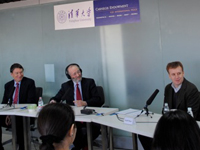Registration
You will receive an email confirming your registration.
IMGXYZ2827IMGZYXThe Carnegie-Tsinghua Center for Global Policy hosted a special edition of BBC’s “The World Tonight,” during which a panel of leading China experts discussed what China wants to achieve with its growing global influence and what the world expects from it. The panel of experts included Sun Zhe, director of Tsinghua University’s Center for U.S.-China Relations; Xie Tao, professor at Beijing Foreign Studies University; John Holden, senior counselor at Hill & Knowlton (China) and former president of the National Committee on U.S.-China Relations; and Geoff Dyer, Financial Times’ Beijing bureau chief. The discussion was moderated by Robin Lustig of “The World Tonight.”
China’s Foreign Relations
- Relations With its Neighbors: While China’s rhetoric in the Asia Pacific region is peaceful, its actions are sometimes perceived by neighboring nations as assertive or even aggressive. This has led to strained relations with Japan and South Korea, according to Xie. The region as a whole has grown increasingly wary of China’s rise in the past eighteen months, Dyer said. South Koreans are angry about China’s policy toward North Korea, he said; Vietnam, worried about China’s growing influence in the South China Sea, even conducted joint navy exercises with the United States; and Singapore, fearing an increased Chinese naval presence, has pressured the United States to remain active in the region.
- Relations With North Korea: Dyer noted that while China has more influence over North Korea than other countries, its power may be more limited that most observers believe. As an example, he cited the strong backlash in Beijing after North Korea’s 2009 nuclear test, which was conducted over Chinese objections. One Chinese panelist doubted that Beijing even knows the full scope of North Korea’s nuclear program. Holden reminded the audience that as much as China often feels embarrassed by its unruly neighbor, it also fears a power vacuum on its border.
- Relations With Africa: A common charge leveled at Chinese investment policies in Africa is that they do not encourage good governance or promote sustainable development. While much of the criticism is valid, Dyer noted, the West should limit its critique because its record is mixed in bringing about positive economic and developmental changes in Africa. On balance, Chinese investment in Africa presents a huge opportunity for the continent and has significantly boosted Africa’s economic growth rate in recent years.
China the Superpower
As Lustig reminded the audience, a growing debate exists about whether China can be classified as a superpower and whether its GDP growth will allow China to avoid major economic obstacles in the future.
- Military Posture: Holden asserted that while China is an important regional power, it cannot be considered a superpower due to its lack of military reach and capabilities. Dyer agreed, reminding the audience that U.S. military spending is still ten times more than China’s.
- Economic Challenges: One Chinese panelist noted that while China’s economy is growing rapidly, other indicators of national wealth place China far below developed states. Growing inflation is also a problem, Dyer noted; as food prices rise, the current economic boom might slow down. Appreciating the value of the renminbi will also exacerbate unemployment problems in China, one Chinese expert explained, making China reluctant to take this step. Moreover, China does not want to appear to be giving into American pressure on its currency exchange rate policy, making such appreciation unlikely.
